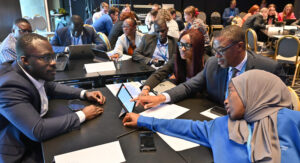Tallinn Cyber Diplomacy Summer School
The application period for the 2026 Summer School is planned to open in April 2026.

5 days
Week long event
A flagship programme advancing global cybersecurity, diplomacy, and digital governance. Over five days, participants engage in in-depth discussions on international law, cyber norms, and capacity building, tackling challenges such as cyber threats, cybercrime, and AI’s strategic impact. The event fosters collaboration, knowledge-sharing, and practical skills to help shape a secure, stable, and open cyberspace.
60
Cyber diplomats per year
The Summer School is designed for mid-career professionals and emerging leaders working on challenging tasks such as digitalisation, cybersecurity capacity building, critical infrastructure protection, and strengthening national cyber resilience. Participants include diplomats, policy advisors, technical experts, and government officials who play key roles in shaping a secure and cooperative digital future.
50+
Countries each year
Every year, the Summer School welcomes cyber diplomats, policy makers and experts from more than 50 countries. Over the past three editions, our alumni network has grown to include representatives from 80+ countries, fostering international cooperation and strengthening cyber diplomacy worldwide.
Useful info and links
The application period for the Tallinn Cyber Diplomacy Summer School 2025 is now closed, and participants have been selected.
Here you’ll find key information to help you prepare for the Summer School.
We’ve gathered all the essentials – from the concept note and agenda to the “Welcome to Estonia” guide, which includes practical tips on weather, dress code for the Summer School events, transportation, and even a few basic Estonian phrases to get you started.

Focus areas
The Summer School covers a wide range of critical topics, including:
- Cybersecurity as an enabler of digital society
- International frameworks and norms for cyber stability
- State responsibility and accountability in cyberspace
- Cyber capacity building and resilience
- Emerging technologies like AI and their strategic impact

What to expect?
Each year, the Summer School delivers:
- Expert-led sessions by leading cyber diplomats, researchers, and policymakers
- Practical workshops and cyber exercises to build skills for real-world scenarios
- Field visits to key institutions for firsthand insights into cyberdefence strategies
- Cultural and networking programs to build global connections

Ready to Join?
The Tallinn Cyber Diplomacy Summer School is an application-based program. Invitations to apply are sent through embassies, ministries, EU institutions, and other relevant governmental bodies.
The selection committee carefully evaluates applications, prioritising foreign service officials and representatives of public authorities responsible for cybersecurity and cyber governance. If additional seats are available, applicants from other national organisations may also be considered.